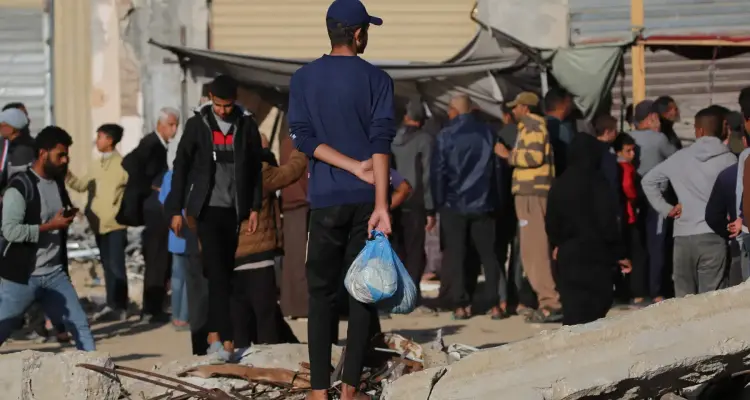Sana'a - (Saba):
With more than 18 months of Israeli genocidal warfare against defenseless civilians in the besieged Gaza Strip, the Israeli enemy is deliberately perpetuating starvation and thirst as a weapon parallel to military aggression, thus completing the genocidal war.
Hunger and thirst are no longer just daily suffering; rather, the two essential elements of life have transformed into an existential threat threatening the lives of the Strip's residents, who have been suffering under the yoke of relentless Israeli bombardment and ongoing aggression for more than a year and a half.
Gaza, a country of pride and steadfastness, is now facing one of the most severe humanitarian crises in its history, after the Israeli enemy closed the crossings, prevented the entry of aid, and cut off water supplies by cutting off desalination networks.
Numerous international and local organizations are pointing to the tragic living conditions in Gaza, the lack of basic supplies due to the blockade and the denial of aid, and the severe shortage of drinking water, threatening the lives of more than two million people.
The tragic living conditions coincide with the Gaza Strip's severe shortage of medicines and medical supplies, amid warnings of a complete collapse of humanitarian services if these conditions persist without urgent intervention from the international community.
The Israeli enemy continues its deliberate bombing of hospitals and health facilities, most recently the Israeli army's bombing of the Al-Ahli Baptist Hospital in Gaza City on Sunday, with the aim of further stifling the remaining elements of life and targeting the last refuge there, represented by hospitals, while simultaneously perpetuating the factors of death and annihilation.
In light of the ongoing blockade and the complete closure of crossings, the humanitarian catastrophe is worsening, and the Gaza Strip is unable to provide food and water to the population. This portends an imminent disaster threatening the lives of civilians. Amid the destruction of infrastructure, the collapse of desalination plants, and fuel shortages, access to food and water has become a daily challenge for more than two million people.
The Mekorot pipeline, which supplies 70% of Gaza City's water needs, has been deliberately shut down, and water networks and wells have been destroyed by ongoing airstrikes, leading to a near-total collapse of the water infrastructure.
Official Palestinian reports indicate that the per capita water supply has declined from 84.6 liters per day before the war to only 3 to 15 liters today. This amount does not cover the minimum level of survival, and the current available quantities do not exceed 10 to 20% of the Gaza Strip's needs.
The severe water shortage forces residents to stand in long lines to obtain limited quantities, while scenes of water being transported in primitive tanks have become a daily reality for more than two million people.
Palestinian statistics indicate that 39 wells have been completely destroyed, 93 wells have been severely damaged, and only 17% of the 284 groundwater wells are operational.
Sixty-seven percent of water and sanitation facilities have been destroyed, and 80% of municipal equipment, including water pumps and treatment equipment, has ceased operation.
With 95% of international desalination plants shut down due to power outages, access to clean water has become an existential challenge in the Gaza Strip, threatening a widespread health collapse.
UN Special Rapporteur Francesca Albanese warned that the power outage would mean a complete shutdown of desalination plants, threatening genocide. Meanwhile, international organizations such as Human Rights Watch and Oxfam accused the Israeli enemy of using water as a weapon of war by depriving the population of the minimum human requirement for survival, which ranges between 15 and 20 liters per day, according to the World Health Organization.
The rate of acute malnutrition among children under two years old has risen alarmingly, reaching 15% of children in northern Gaza and 5% in the south.
The Rome Statute of the International Criminal Court stipulates that intentionally starving civilians by "depriving them of objects indispensable to their survival, including wilfully impeding relief supplies, constitutes a war crime." Criminal intent does not require a confession by the attacker; it can also be inferred from the overall circumstances of the military campaign. However, it restricts this crime to international armed conflicts.
The policy of starvation was not new to the Israeli enemy. It began starving Palestinians years ago when it imposed a blockade, restricting the entry of aid, which has become a lifeline for many of the besieged population. This policy accelerated since October 7, when the Israeli enemy adopted a scorched-earth policy, destroying crops, preventing residents from accessing them, closing crossings, and preventing the entry of aid trucks.
The UN Special Rapporteur on the Right to Food asserts that the previous Israeli policy created a state of fragility in Gaza, which enabled it to rapidly precipitate famine, given the precariousness of the situation. He notes that this rapid collapse in the humanitarian situation, particularly among children, is unprecedented worldwide. This short period of time.
Famine and malnutrition cause health problems. The heart, lungs, ovaries, and testicles shrink due to muscle contraction. The brain attempts to protect the body by reducing some vital functions, such as digestion, which leads to diarrhea.
With full American support, the Israeli enemy has continued its genocide in Gaza since October 7, 2023, resulting in approximately 167,000 Palestinian deaths and injuries, most of them women and children, in addition to more than 11,000 missing persons.

| more of (Reports) |




